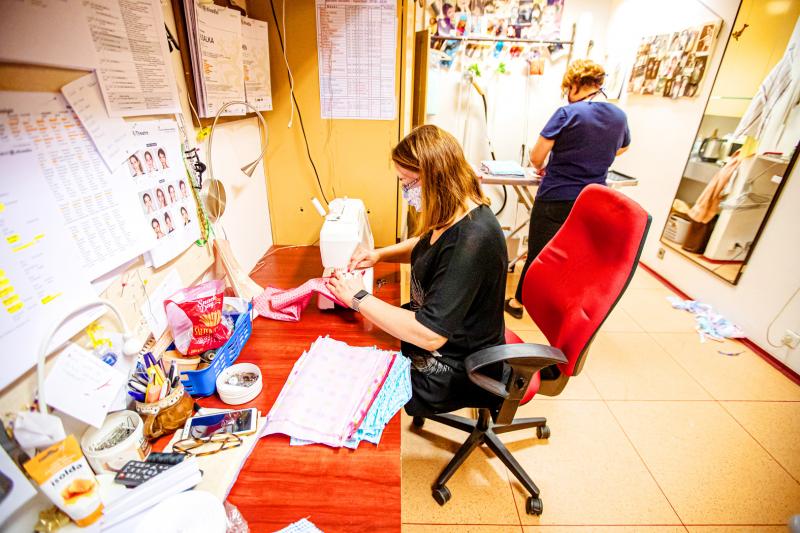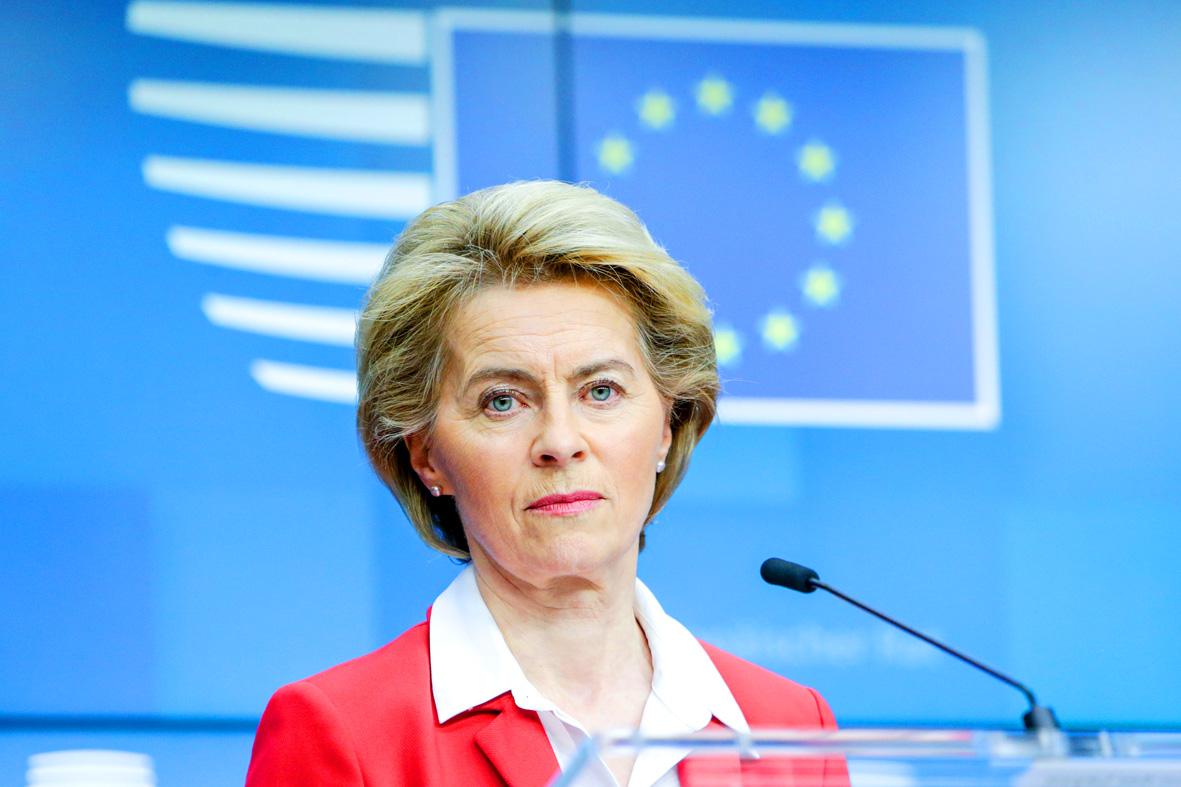EU leaders on Tuesday agreed to immediately impose travel restrictions on most foreigners entering Europe for at least 30 days to limit the spread of COVID-19, and to set up fast-track transport lanes to keep vital medical equipment, food and goods flowing smoothly inside the bloc.
As the virus case count in Europe climbed to more than 60,000 and with more than 2,700 people dead, nervous national governments have introduced quick-fix measures such as partial border closures and quarantines with little consultation.
The EU sought over three hours of video talks to forge a united front against an illness that is also wreaking economic havoc.

Photo: EPA-EFE
“We reaffirmed the need to work together and do everything necessary to tackle the crisis and its consequences,” European Council President Charles Michel told reporters.
He said the 27 EU countries agreed to impose border restrictions on tourism and non-essential business “as fast as possible.”
The plan exempts long-term EU residents, diplomats, some healthcare and transport workers.

Photo: AFP
European Commission President Ursula von der Leyen said her proposal for the restrictions “got a lot of support by the member states. It’s up to them now to implement. They said they will immediately do that.”
German Chancellor Angela Merkel said the leaders agreed in a conference call to an entry ban with “very, very limited exceptions,” and that Germany would start implementing it immediately.
Merkel said citizens of Switzerland, Liechtenstein, the UK and Norway are exempt.
The EU leaders also agreed to coordinate the repatriation of EU citizens stranded outside the bloc, the chancellor said.
Von der Leyen said they also backed a proposal to set up “green lanes” for trucks and other priority vehicles aimed at beating the traffic jams that have formed around crossing points on internal borders, where no ID or vehicle checks were required just days ago.
Those transport guidelines, “have to be implemented now,” she said.
The leaders agreed to meet again for a third video conference and to cancel a summit they planned to attend in Brussels late next week.
“We are ready to do everything that is required. We shall not hesitate to take additional measures as the situation evolves,” Von der Leyen told reporters.
After Italy, ground zero in Europe’s battle with COVID-19, Spain and now France have imposed lockdowns, confining citizens to their homes except for urgent business such as buying food or heading to any hospital that might still have the capacity to treat them.
Nine countries have informed the European Commission that they have reintroduced ID checks inside Europe’s passport-free Schengen Area, including Austria, Hungary, the Czech Republic and Poland.
The EU proposals endorsed on Tuesday are relatively modest, as Europe’s centralized powers in this crisis are limited.
Russia yesterday said it would introduce temporary restrictions on flights to the UK, the US and the United Arab Emirates starting tomorrow in a bid to curb the spread of the coronavirus.
However, the restrictions would only apply to certain passenger flights and some airlines would also be allowed to service Moscow flights to and from London, New York and Abu Dhabi.
Meanwhile, an internal EU document says that Russian media have deployed a “significant disinformation campaign” against the West to worsen the impact of the coronavirus, generate panic and sow distrust.
“A significant disinformation campaign by Russian state media and pro-Kremlin outlets regarding COVID-19 is ongoing,” said the document, dated Monday.
“The overarching aim of Kremlin disinformation is to aggravate the public health crisis in Western countries ... in line with the Kremlin’s broader strategy of attempting to subvert European societies,” said the document, produced by the EU’s foreign policy arm, the European External Action Service.
Additional reporting by Reuters

Kehinde Sanni spends his days smoothing out dents and repainting scratched bumpers in a modest autobody shop in Lagos. He has never left Nigeria, yet he speaks glowingly of Burkina Faso military leader Ibrahim Traore. “Nigeria needs someone like Ibrahim Traore of Burkina Faso. He is doing well for his country,” Sanni said. His admiration is shaped by a steady stream of viral videos, memes and social media posts — many misleading or outright false — portraying Traore as a fearless reformer who defied Western powers and reclaimed his country’s dignity. The Burkinabe strongman swept into power following a coup in September 2022

‘FRAGMENTING’: British politics have for a long time been dominated by the Labor Party and the Tories, but polls suggest that Reform now poses a significant challenge Hard-right upstarts Reform UK snatched a parliamentary seat from British Prime Minister Keir Starmer’s Labor Party yesterday in local elections that dealt a blow to the UK’s two establishment parties. Reform, led by anti-immigrant firebrand Nigel Farage, won the by-election in Runcorn and Helsby in northwest England by just six votes, as it picked up gains in other localities, including one mayoralty. The group’s strong showing continues momentum it built up at last year’s general election and appears to confirm a trend that the UK is entering an era of multi-party politics. “For the movement, for the party it’s a very, very big

ENTERTAINMENT: Rio officials have a history of organizing massive concerts on Copacabana Beach, with Madonna’s show drawing about 1.6 million fans last year Lady Gaga on Saturday night gave a free concert in front of 2 million fans who poured onto Copacabana Beach in Rio de Janeiro for the biggest show of her career. “Tonight, we’re making history... Thank you for making history with me,” Lady Gaga told a screaming crowd. The Mother Monster, as she is known, started the show at about 10:10pm local time with her 2011 song Bloody Mary. Cries of joy rose from the tightly packed fans who sang and danced shoulder-to-shoulder on the vast stretch of sand. Concert organizers said 2.1 million people attended the show. Lady Gaga

SUPPORT: The Australian prime minister promised to back Kyiv against Russia’s invasion, saying: ‘That’s my government’s position. It was yesterday. It still is’ Left-leaning Australian Prime Minister Anthony Albanese yesterday basked in his landslide election win, promising a “disciplined, orderly” government to confront cost-of-living pain and tariff turmoil. People clapped as the 62-year-old and his fiancee, Jodie Haydon, who visited his old inner Sydney haunt, Cafe Italia, surrounded by a crowd of jostling photographers and journalists. Albanese’s Labor Party is on course to win at least 83 seats in the 150-member parliament, partial results showed. Opposition leader Peter Dutton’s conservative Liberal-National coalition had just 38 seats, and other parties 12. Another 17 seats were still in doubt. “We will be a disciplined, orderly